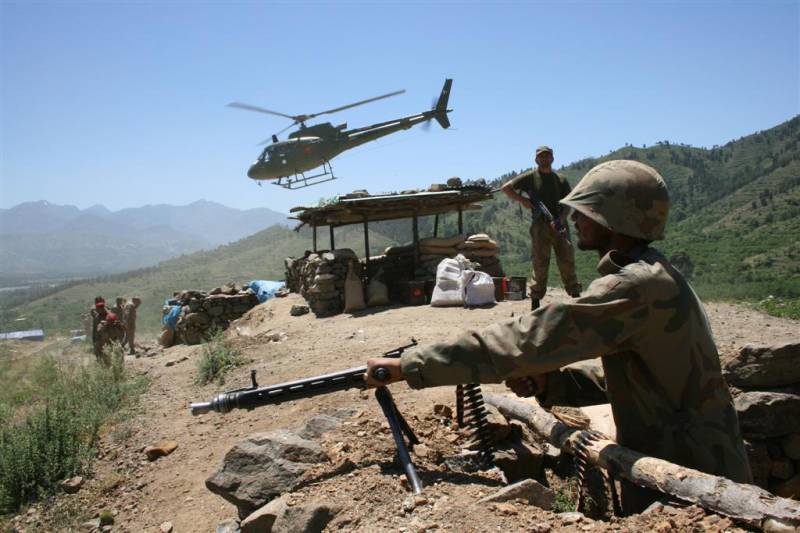As an aftermath of the deteriorated security situation in mid February, a crackdown of the militants breeding along the Durand Line was needed. The eyes still cannot forget the pain inflicted by the back to back attacks in Lahore, Quetta, Charsadda, Peshawar and Mohmand and even the beating heart of Sindh, Sehwan.
In the moment when we needed a strong, roaring NAP, its implementation was nowhere to be seen. ‘Long forgotten’ maybe the right term to call it. Even after the attack, the nation questioned the effectiveness of the National Action Plan and how relevant it has been in abating terrorism. There were speculations about the previously held operations too. People wanted answers about the previous operations like Zarb-e-Azb and Army’s claim of clean sweeping terrorism from Pakistan.
Pakistan’s history in terms of being a breeding ground of terrorism has been rich, unfortunately. We have seen multiple terror groups first being nurtured and then spreading profusely all across the country like an infectious disease. Notable names include Jamaat-ul-Ahraar, Lashkar-e-Jhangvi, Pakistan and Afghanistan Tehreek-e-Taliban and now ISIS. These militant outfits were burgeoning and feeding on the flesh and blood of the resources of Pakistan. They set up their camps in the outskirts and tribal areas and began trading narcotics, discovering new routes for smuggling drugs and weapons and started making alliances with other militant groups as well.
Another thing these terrorist factions were capable of doing was that they provided money and food to the youngsters and talked them into becoming an active participant of their militant organization. Malala Yousafzai, in her book I Am Malala explained the reason why a large number of youngsters were joining the Mullah Fazlullah led TTP organization in Swat. She mentions that it was due to Mullah Fazlullah’s radio channel which reached out to the people of Swat, that he managed to convince the locals to join his organization. Women of Swat began selling their possessions and giving out their money and jewelry to support the cause of Mullah Fazlullah led Taliban. The moment when all the efforts to negotiate started failing, Pakistan Army launched the Swat operation and saved the people of the misery of being ruled under so called Shariah law.
The most evident proof in terms of how effectively Pakistan Army has regained the control of a terrorist held area is Swat. Once considered getting out of hand of the Pakistan rule of law, Swat was recovered and peace was restored in it. Pakistan Army made sure that international donor organizations get attentive toward Swat and invest in better education facilities and provide incentives for better employment opportunities for the people of Swat.
Zarb-e-Azb is another major example where Pakistan Army worked hard to cleanse major cities and villages of terrorism. It was when terrorists were creating unrest all over the country and using North Waziristan as their base. The main reason which led to the start of this operation was the TTP and Islamic Movement Of Uzbekistan attack on Jinnah International Airport in Karachi which claimed 36 lives. The journey was not easy. We had to witness the deadliest attack on APS in Peshawar, which killed almost 144 people, mostly children. The attack was carried out as revenge for Zarb-e-Azb by TTP and IMU. They reasoned killing children by saying that Pakistan Army also attacks their women and children. However, our armed forces meant to uproot each and every outlet of terrorists manufacturing suicide bombers and militant trainers.
The operation was a big success and Pak-Afghan border was evacuated from the nexus of terrorist organizations. Peshawar after a long time was peaceful, and the same was the case with Quetta. By mid 2015, we saw a Pakistan that was much more peaceful. The idea of bringing back international cricket was suggested, the economy certainly got better, the talks of CPEC were in the air and Pakistan-China friendship was lauded due to this multi-billion project. Other foreign states like Russia, Iran and Nepal also were coming on good terms with Pakistan.
Everything seemed poised and perfect. Sure, there were issues, but we seemed to have left terrorism far far behind, somewhere in the past. But February 2017 brought some bad news for us. The back to back attacks in Lahore, Sehwan and Charsadda, and Lahore yet again raised severe speculations on the role of the Pakistan military and its claims to have evacuated terrorism from Pakistan.
However, Pakistan Army took immediate action in terms of Radd-ul-Fasaad for the militants in Punjab. The 12 hideouts of the terrorist camp along the Afghan borderline were destroyed and about 20 terrorists were killed. Rehman Baba, the trainer of the Jamat-ul-Ahrar, was also killed. These terrorist factions were operating along the Afghan borderline and were creating unrest within the country. Apparently independent, but in reality operating with the support provided by NDS (Afghanistan’s National Directorate Of Security) and Indian RAW, these terrorist organization meant to disrupt CPEC. Pakistan Super League (PSL) final was also due in Lahore, but a terror situation was created for the organizing body to try to change this plan.
The question that arises is that given that Radd-ul-Fasaad has started and the results have already started coming in, are negotiations also one of the ways through which peace can be achieved? Pakistan’s diplomacy needs to involve Iran, Russia, China and Turkey to overtly maintain a geostrategic sphere to neutralize India and its proxy Afghanistan’s measures to create disruption in Pakistan.
There is no doubt now that Radd-ul-Fasaad has been launched, it will have a massive impact and it will achieve milestones. But for the longevity of its impact there is a need for solid strategies involving Pak-Afghan border management and deweaponization all across the country.






